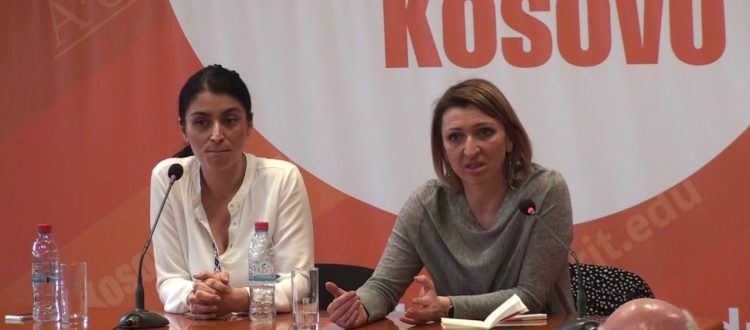Investigative journalist Jeta Xharra – challenging politicians and patriarchy in the Balkans
Reporter Jeta Xharra talks about misogyny in journalism, and how she uses her live TV show to challenge politicians on gender inequality.
| Suggested Reading | Collaborate | GCCT |
By Nora Jusufi, Lara Whyte and Claire Provost
It’s hard to imagine someone underestimating Jeta Xharra. Today, she is one of the best-known investigative journalists in the Balkans. Last month, she travelled to Strasbourg, France to speak at the Council of Europe’s World Forum for Democracy, which asked: is populism a problem?.
But underestimating her is exactly what a long series of men appear to have done. “They would treat me like I was a little bit stupid,” she said. “‘Let me tell you, you need to be enlightened.’ And, I would say: ‘Yes, please, I don’t know anything, please tell me.”
As a journalist, Xharra said she used this to her advantage, to get quotes and “get into stories and be a fly on the wall…because you’re considered as somebody that needs to have things explained three times, because you might be a less intelligent creature.”
Xharra started working for British TV stations in the Balkans in the late 1990s. For over a decade she has run the Balkan Investigative Reporting Network (BIRN) office in Prishtina, Kosovo. She also hosts the award-winning and widely-popular current affairs TV programme, Life in Kosovo.
In Strasbourg, Xharra spoke on a panel entitled “Media: friend or foe of democracy?”. On the sidelines of the event, she talked to openDemocracy 50.50 and youth delegate Nora Jusufi about misogyny in journalism and how she uses her TV show to challenge politicians.
Recent, internationally-reported sexual harassment scandals have shown how pervasive abuse in the workplace is, with men using “their position as bosses to impose themselves sexually in women,” said Xharra, who also has master’s degrees in war studies and screenwriting.
But, in the Balkans there have been no high-profile legal cases, “unlike in the west, where men are actually starting to fear lawsuits from women.” Xharra faulted a deeply-rooted patriarchal culture with discouraging women from pursuing journalism careers in the first place.
It’s seen as a “tough” profession, she said, and male interviewees “might not want to look at you in the eye, but to look at you elsewhere…you have to make a point over and over again to hold people’s gazes, to go back to the subject.”
She said she found ways to use gender discrimination to her advantage, including while working as a reporter for the BBC in wartime Kosovo, in the late 1990s, when she found it easier than male colleagues to pass through police checkpoints.
But while she has built a high-profile career and is well-known in the Balkans today, misogyny still impacts her day to day life. “Rather than being called persistent and successful, I am often labelled aggressive,” she said. “By normal standards, I would be just a very persistent journalist.”
Using her TV show, and national platform, Xharra has sought to secure on-air gender equality commitments from politicians in Kosovo, including on the issue of property rights.
This is not a “legislative battle because in paper Kosovo laws are copy-pasted from the EU,” Xharra told us. Instead: “What we’re fighting is a mentality battle.” Currently, the vast majority of property in Kosovo is registered in men’s names, she said, because “dads leave their properties to their sons, the husbands are the only ones [that own] the entire family property.”
For women, this means “if you want to open a business, start a small business, you can’t get a loan because you have nothing under your name.” And, if women ask for property rights, it is seen as a request “for independence from the husband – ‘why would she ever do that?’ Supposedly, she should always be respectful to the man in the family.”
On her TV programme, Xharra has invited mayoral candidates to commit on live broadcasts that they will equally share property rights with their wives and with their daughters. She said “families have gone for decades not having that conversation, because it’s a taboo,” though this is now starting to change.
Recently, Xharra has also interviewed the wives of mayoral candidates, about “the kind of life they lead, are they much richer or poorer, are they of the people.” These interviews have been controversial among some viewers for what they omitted: substantive questions about these women’s own viewpoints on work and politics.
We also asked Xharra about this in Strasbourg. “In order to encourage them to be on camera, one of the conditions was to not be asked about their political viewpoints,” she said. “It would be great” to have more women presenting their political views, Xharra added, but they’re unlikely to be candidates’ wives, who “would never go against the program of their husbands.”
Nora Jusufi is a development economist and feminist activist. She currently works as a researcher at the Prishtina-based think tank GAP Institute‘s Sustainable Economic and Social Development Unit. Nora has worked with civil society organisations including on procurement research, access to justice, economics, and public policy.
Lara Whyte is an investigative journalist and award-winning documentary and news producer focusing on issues of youth, extremism and women’s rights. Originally from Belfast in northern Ireland, Lara is based in London. She is currently commissioning editor (special projects) for 50.50 tracking the backlash against sexual and reproductive rights. Find her on Twitter: @larawhyte.
Claire Provost is editor of openDemocracy 50.50 covering gender, sexuality and social justice. Previously she worked at The Guardian and was a fellow at the Centre for Investigative Journalism at the University of London, Goldsmiths. Find her on Twitter: @claireprovost.
This article was originally published by OpenDemocracy and is available by clicking here. The views expressed in this article do not necessarily reflect those of TransConflict.



















